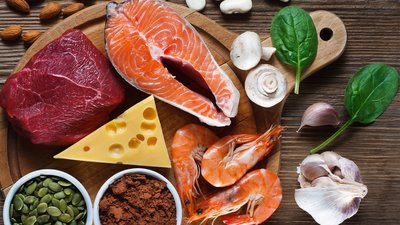When it comes to making sure all your dietary bases are covered, don't forget to get enough zinc. Having too much of it doesn't do you much good, but not having enough can be a problem because you lose a little zinc every time you sweat. This is especially true for hard-working athletes.
What is Zinc?
Zinc is an essential mineral, meaning that it isn't produced by your body and must be consumed as part of your diet. You can find it in high levels in shellfish, several meat products, eggs, and fish. Zinc plays a positive role in a number of bodily functions, but it can also disrupt your body's ability to use other nutrients.
What Does Zinc Do?
Zinc's main job is to help enzymes in your body that have to do with everything from maintaining proper immune function to protection from free radicals, groups of atoms that can damage living cells and tissue. Zinc also helps enzymes such as carbonic anhydrase and carboxypeptidase, which remove carbon dioxide your body produce through normal metabolic processes. Zinc also helps maintain healthy levels of testosterone, especially in men.[1]
Zinc is heavily involved in the formation of new nerve cells and synapses, and certain aspects of metabolism. It helps regulate a protein called Brain Derived Neurotrophic Factor (BDNF), which is essential for normal nervous system functioning. Lack of zinc may reduce the effectiveness of BDNF, which can lead to cognitive deficits such as reduced memory capacity and may even play a role in the onset of depression.[2,3]
With all these jobs to do, it's easy to see why zinc deficiency can wreak havoc on the body. Athletes, laborers, and other people who do intense physical activity tend to be deficient in zinc. Vegetarians and vegans also need to make sure that they are getting all the zinc their bodies need.
Can You Get All the Zinc You Need From Foods?
The Recommended Daily Allowance (RDA) of zinc is only 11 milligrams per day.[4] Most zinc is lost through sweating and must be replaced by eating certain foods or by supplementation.

If you like seafood, oysters have one of the highest proportions of zinc of any food. A 100-gram serving of oysters contains approximately 78 milligrams of zinc, more than 500 percent of the RDA. If oysters aren't your thing, then grass-fed beef or lamb meat provides more than enough zinc.
While plant sources tend to be lower in zinc, there are some plant-based alternatives. If you're a vegan or vegetarian, or just want more variety in your diet, eat lots of spinach, nuts, mushrooms, and many types of beans. These foods contain small amounts of zinc compared to other sources, but they can still provide enough to meet your RDAs.
What Are the Best Zinc Supplements?
One zinc supplement that has become very popular is zinc monomethionine aspartate (ZMA). Often recommended as a sleep supplement, ZMA is a blend of zinc and magnesium that also contains vitamin B-6. It has been suggested that because of zinc's role in maintaining healthy testosterone levels, ZMA supplementation may act as a testosterone booster along with boosting zinc and magnesium levels. Research on this issue is not entirely settled, with some studies reporting increased testosterone levels as a result of using ZMA, and other studies reporting no difference compared to use of a placebo.[5,6]
A recent study reported that after eight weeks of zinc supplementation, the segments of a study group that took the supplements had significantly elevated antioxidant capacity. This included increases in enzymes whose function it is to work against the toxic effects of free radicals.[7] The supplements also appeared to result in a moderate reduction in substances in the body that lead to inflammation.[8] Almost any multivitamin will work, too.
Are There Side Effects From Getting Too Much Zinc?
Although the RDA for zinc is 11 milligrams, it's not unusual for people to take 30 milligrams or more a day. Most of the potentially harmful effects of zinc come from acute super-loading of as much as 300 milligrams of zinc per day. At these higher doses, the most common side effects are nausea and vomiting.
But even at lower doses, zinc supplementation can have its drawbacks. Zinc competes with copper and iron uptake into the bloodstream, so too much zinc in the diet can lead to reduced absorption of these other important minerals. Zinc and iron often must compete to be absorbed into the bloodstream. There is evidence that even with a 1:1 zinc-iron ratio, your body will choose to absorb the zinc first, which can lead to an iron deficiency.[9,10] The best way to avoid this is to avoid consuming large amounts of either nutrient at the same time.
Zinc also interacts with copper. Research has shown that following zinc supplementation, more copper is excreted through urine.[11] This has potential to lead to copper deficiency over time unless you increase your copper intake, too.
Top Selling Zinc Products
References
- Prasad, A. S., Mantzoros, C. S., Beck, F. W., Hess, J. W., & Brewer, G. J. (1996). Zinc status and serum testosterone levels of healthy adults. Nutrition, 12(5), 344-348.
- Yang, Y., Jing, X. P., Zhang, S. P., Gu, R. X., Tang, F. X., Wang, X. L., ... & Wang, J. Z. (2013). High dose zinc supplementation induces hippocampal zinc deficiency and memory impairment with inhibition of BDNF signaling. PLoS One, 8(1), e55384.
- Amani, R., Saeidi, S., Nazari, Z., & Nematpour, S. (2010). Correlation between dietary zinc intakes and its serum levels with depression scales in young female students. Biological Trace Element Research, 137(2), 150-158.
- Table, E., & Table, V. (2001). Dietary reference intakes for vitamin A, vitamin K, arsenic, boron, chromium, copper, iodine, iron, manganese, molybdenum, nickel, silicon, vanadium, and zinc.
- Wilborn, C. D., Kerksick, C. M., Campbell, B. I., Taylor, L. W., Marcello, B. M., Rasmussen, C. J., ... & Kreider, R. B. (2004). Effects of zinc magnesium aspartate (ZMA) supplementation on training adaptations and markers of anabolism and catabolism. Journal of the International Society of Sports Nutrition, 1(2), 12.
- Brilla, L. R., & Conte, V. (2000). Effects of a novel zinc-magnesium formulation on hormones and strength. Journal of Exercise Physiology Online, 3(4), 26-36.
- Kara, E., Gunay, M., Cicioglu, I., Ozal, M., Kilic, M., Mogulkoc, R., & Baltaci, A. K. (2010). Effect of zinc supplementation on antioxidant activity in young wrestlers. Biological Trace Element Research, 134(1), 55-63.
- Bao, B., Prasad, A. S., Beck, F. W., Fitzgerald, J. T., Snell, D., Bao, G. W., ... & Cardozo, L. J. (2010). Zinc decreases C-reactive protein, lipid peroxidation, and inflammatory cytokines in elderly subjects: a potential implication of zinc as an atheroprotective agent. The American Journal of Clinical Nutrition, 91(6), 1634-1641.
- Espinoza, A., Le Blanc, S., Olivares, M., Pizarro, F., Ruz, M., & Arredondo, M. (2012). Iron, copper, and zinc transport: inhibition of divalent metal transporter 1 (DMT1) and human copper transporter 1 (hCTR1) by shRNA. Biological Trace Element Research, 146(2), 281-286.
- Tandy, S., Williams, M., Leggett, A., Lopez-Jimenez, M., Dedes, M., Ramesh, B., ... & Sharp, P. (2000). Nramp2 expression is associated with pH-dependent iron uptake across the apical membrane of human intestinal Caco-2 cells. Journal of Biological Chemistry, 275(2), 1023-1029.
- Festa, M. D., Anderson, H. L., Dowdy, R. P., & Ellersieck, M. R. (1985). Effect of zinc intake on copper excretion and retention in men. The American Journal of Clinical Nutrition, 41(2), 285-292

